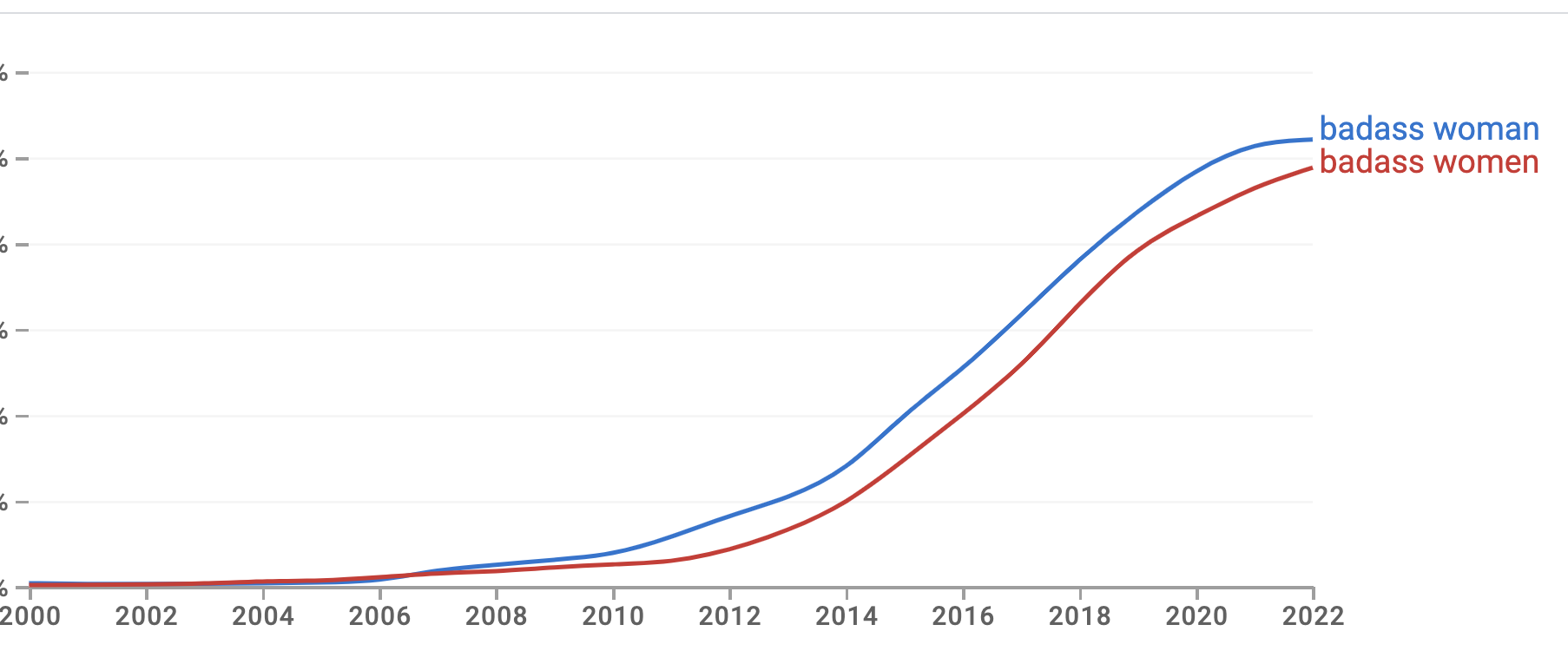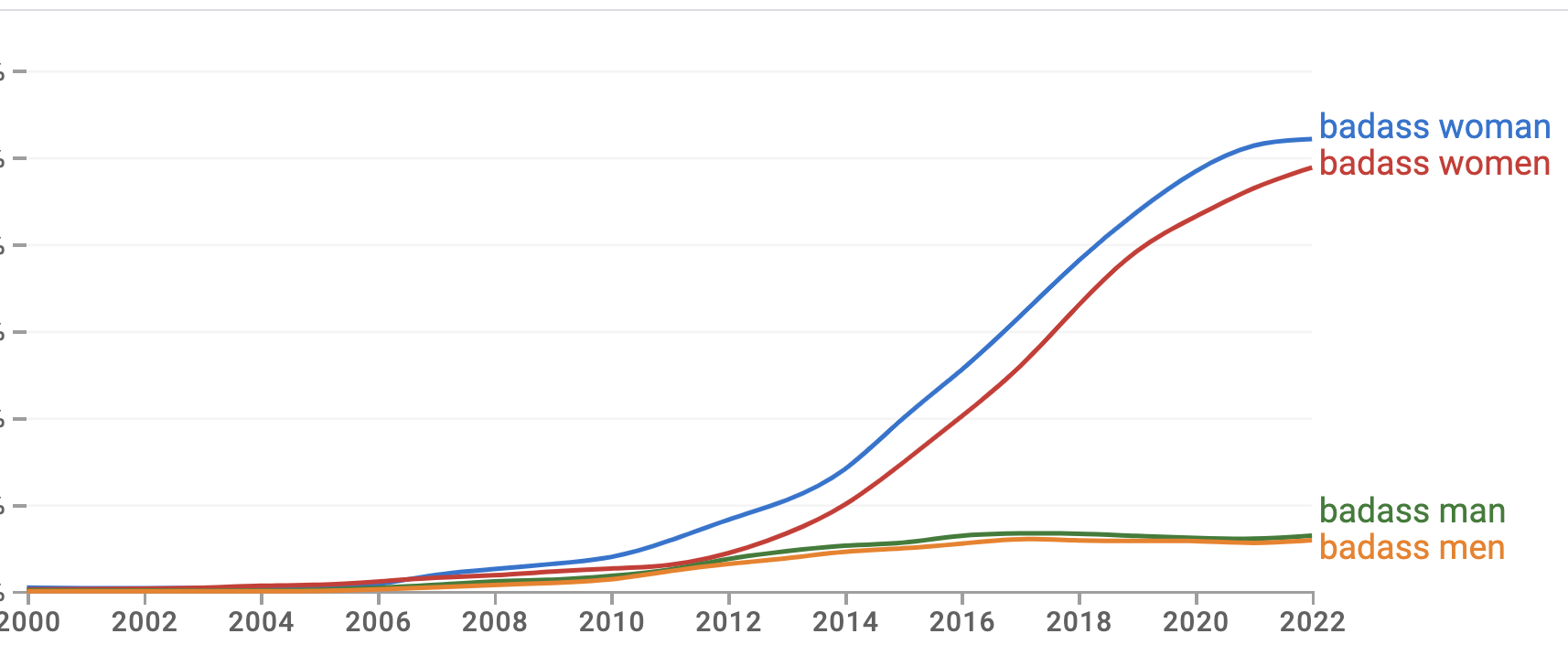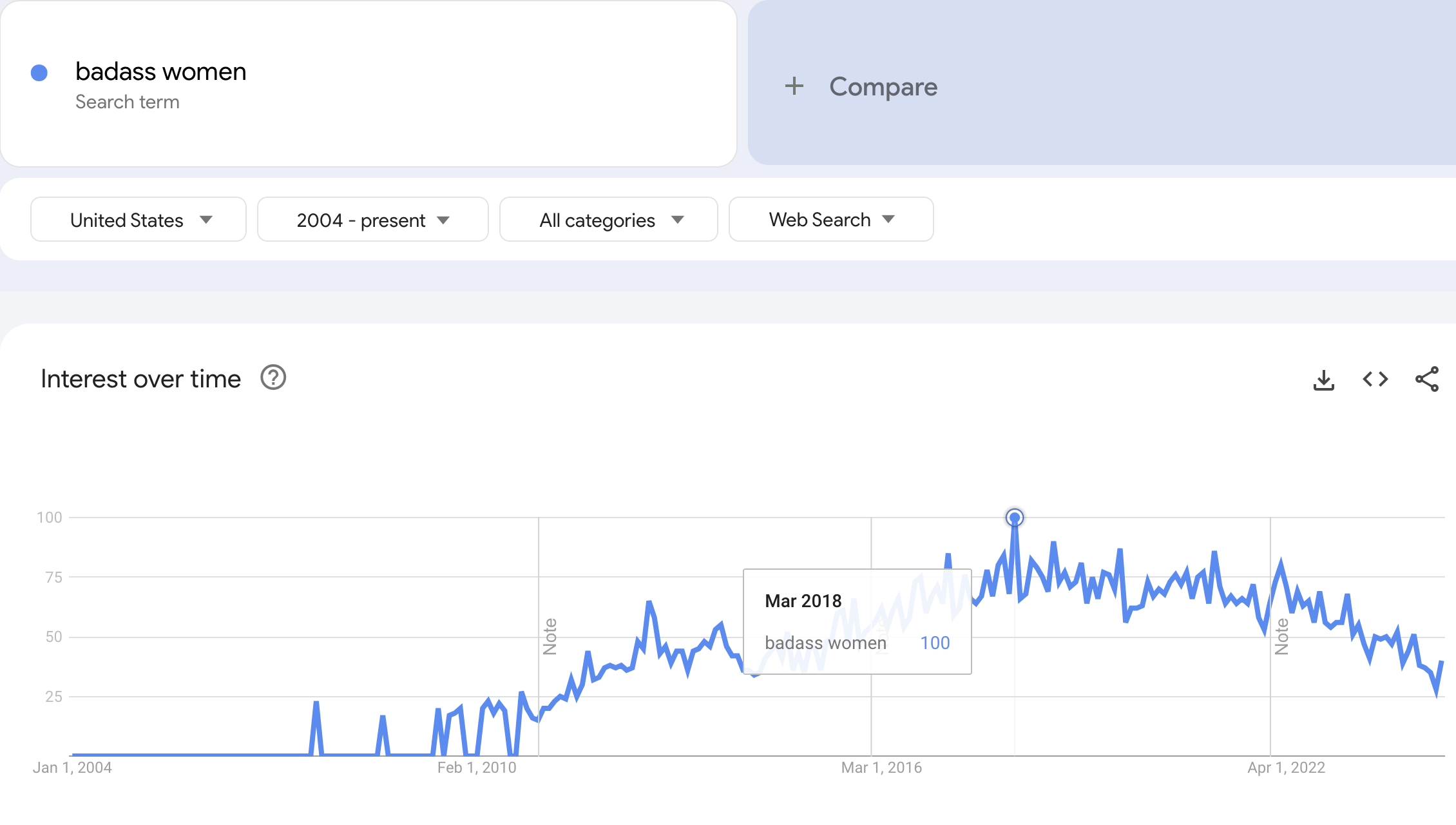More on gendered badass
« previous post | next post »
Following up on yesterday's "'Badass'" post, here's a recent and relevant article complaining that the word has been bleached into meaninglessness, especially as applied to women — Jackie Jennings, "We Need a Word Besides 'Badass' for Our Heroines", Jezebel 6/3/2024:
I am finished with the b-word. It’s been applied to every woman who has ever been publicly competent at anything. It’s been worked to death and rendered meaningless. Everyone from Courtney Love to Martha Stewart to Rosa Parks has been described as one and, at this point, it’s so overused that to call a woman this is a form of dada performance art.
In short: We simply have to stop using the word “badass” to describe any/every woman on earth who has entered the cultural dialogue for something other than a federal crime. And, I’m not a language cop but just know that if you use “badass” and think it conveys anything at all, you simply must think again.
What was once patronizing and gendered is now maddeningly vague and borderline inscrutable. It’s a collection of AI-generated slay queen, #girlboss memes gathered into a single word.
The article gives some of the history, including a link to Megan Garber, "How ‘Badass’ Became a Feminist Word", The Atlantic 11/22/2015 ("The term used to celebrate the Clint Eastwoods and Chuck Norrises of the world. Now, it celebrates the Beyoncés and the Everdeens.")
The 2024 Jezebel article's take:
The word badass first originated in the 1950s and was used to describe cool dudes and bad boys. (You know, leather jacket, pompadour, authority issues, etc.) The connotation was slightly negative and generally only applied to men. At some point, badass became a term used for women who liked video games or could wield a sword. Sure you could call Luke Skywalker a badass but it felt way more applicable to Leia. Fast-forward several decades to 2015 when Google Trends reported that searches of “badass women” were at an all-time high. That year was also when the discourse around women-as-badasses seemed to begin in earnest.
Some folks were like, “Awesome! Women are badasses too! This, indeed, is feminism.” Others felt differently. Being called a badass felt like being called “ballsy” or told to lean in, all nods to the idea that the main problem with women is that they aren’t men.
There are two (somewhat contradictory) objections here: first, that the term implicitly praises women for being like men; and second, that the term has undergone semantic bleaching to the point of being "worked to death and rendered meaningless".
Both complaints seem to be somewhat true, although semantic bleaching of frequently-used words is pretty much inevitable, and you can find complaints from the other direction about female-associated words being used to praise men who are thereby seen as insufficiently masculine — so that the change can be seem as part of a general relaxation of gender stereotypes.
In any case, neither complaint seems to be working, in that the frequency of describing (and generally praising) women as badass has continued to increase, according to Google Ngrams:
The frequency of "badass men" has not increased to the same extent.
…which might be because the default badass gender is still masculine, rather than because radically fewer males are being described by that word — although the previously cited COCA statistics (mostly based on texts from the 2010s) certainly suggest that the balance has changed.
FWIW, a current Google Trends search for badass woman shows a peak in 2018:
Ben Thompson's Badass of the Week site, in action since 2004, is still somewhat behind the sociolinguistic gender curve: the 2004 archive has 24 males and 0 females; the 2005 archive has 35 males and 2 females; and fast-forwarding to 2023, the archive lists 20 males and 13 females.



Victor Mair said,
August 27, 2024 @ 7:50 am
Similar strictures apply to "women with cojones".
Benjamin E. Orsatti said,
August 27, 2024 @ 8:54 am
Prof. Liberman, you're a dada dude (go ahead, put it on your business card, it's not copywrited) — is it possible that the corpus data is masking important geographical and generational differences? In other words, people of my geography and chronology are as unlikely to use "badass" outside of 1970's blaxploitation movies as we are to say things like "slay queen", "girlboss", "lean in", and other terms I've had to have my kids explain to me like "clapback", "rizz", "skibbidy", and so forth.
Benjamin E. Orsatti said,
August 27, 2024 @ 9:01 am
"data dude", not *"dada dude". I must have been thinking "splatter plot" instead of "scatter plot".
J.W. Brewer said,
August 27, 2024 @ 10:15 am
I'm more than a decade older than Benjamin Orsatti and FWIW although I'm not sure I myself actually utter or write "badass" with any frequency, as situated within my A.D. 2024 passive lexicon it's not slotted the way "slay queen" or "girlboss" are into the category "lexeme primarily/exclusively used by demographic groups that don't include me." Put another way, I would not find it particularly noteworthy as a sociolinguistic datapoint if I noticed another AmEng speaker of my own age, sex, race, and approximate class/educational background uttering "badass" and applying it to a human female.
Jonathan Smith said,
August 27, 2024 @ 10:37 am
From the Guardian article: calling women 'badass' amounts to praising women "for behaving like guys" and is "in fact, a mode of gendered compromise," implying "that it's women’s behaviour rather than the structures and systems that need to change."
Oh joizus what an exhausting take — the point is that "badass," love or hate it/them, means toughcookie/coolcustomer/badbunny and can be applied without respect to gender. Please continue with your work badasses of the world, don't mind the postmodernists, they never met a word or deed they couldn't problematize.
Mark Liberman said,
August 27, 2024 @ 10:38 am
@Benjamin E. Orsatti: "data dude", not *"dada dude".
Being a dada dude is something to aspire to, but I'm not sure that I qualify…
Mark Liberman said,
August 27, 2024 @ 10:41 am
@Victor Mair: "Similar strictures apply to 'women with cojones'."
Jackie Jennings makes exactly that point in the Jezebel article: "Being called a badass felt like being called 'ballsy' or told to lean in, all nods to the idea that the main problem with women is that they aren’t men."
But as her phrasing suggests, "ballsy" is actually quite different, in that it references gender-specific anatomy (albeit metaphorically), rather than personality characteristics with a arbitrarily-associated gender stereotype.
Andreas Johansson said,
August 27, 2024 @ 2:44 pm
I have no particular opinions or insights regarding genderedness or semantic bleachedness, but I do know that "badass" is one of those words that online overuse has left me with a negative opinion of (though not to the same extent as "awesome" and "epic").
Barbara Phillips Long said,
August 27, 2024 @ 3:12 pm
The opposite of the admired "badass woman" seems to be the scorned "grown ass man." As in: A grown ass man should be able to (do his own laundry, make a doctor's appointment, text when he's running late, parent his children instead of "baby-sitting," clean up the kitchen, etc., instead of exhibiting real or weaponized incompetence.)
While "badass" always seems to be solid, with "grown ass" there is also "grown-ass" and "grownass."
J.W. Brewer said,
August 27, 2024 @ 5:17 pm
@Barbara Philips Long: The numerous example sentences collected in Green's Dictionary of Slang going all the way back to circa 1950 have plenty of instances of two-word "bad ass" or hyphenated "bad-ass," although those are mostly (not entirely) earlier in time, with more recent examples being comparatively more likely to be the solid "badass." I assume that as with the evolution away from down-town or base-ball, the solid form is some orthographic evidence of the lexeme being more fully domesticated into the normal lexicon on English, and/or being understood as a unit with its own semantics rather than as a compound with transparently compositional semantics.
Chris Buckey said,
August 27, 2024 @ 5:58 pm
We need a better way to write headlines and statements that the formulation "We Need *thing*".
It's just IMO a very tiresome construction. Why do YOU, the writer, get to decide what "We" need? WHO is WE, anyway?
Benjamin E. Orsatti said,
August 28, 2024 @ 7:30 am
Barbara Phillips Long said:
So, you've been chatting with my wife, have you?
For those of you lamenting the bleached-to-translucence state of "badass" (among the many other affixed (assfixed?) forms of -ass), do what I do — put the emphasis on the "-ass" syllable. Then, you get to say/read things like, "bad áss-wòman, grown áss-màn, crazy áss-idèa", and so forth.
[(myl) You and Randall Monroe.
See also "Can '[adjective]-ass' occur predicatively?". ]
Philip Anderson said,
August 28, 2024 @ 1:40 pm
@Chris Buckey
“We” means “I and people like me”, i.e. all right-thinking people.
Benjamin E. Orsatti said,
August 29, 2024 @ 7:13 am
MYL wrote:
*sigh*. Makes me wonder what other eructations from the ol' soggy gray meatloaf are mere unconscious bubblings-up from stuff I read on the internet.
Chas Belov said,
August 30, 2024 @ 4:17 pm
Ah, but if you search "badass" without any gender marker it far outpaces any of the gendered versions. I realize that a gender marker could have appeared elsewhere in the sentence.
Search Google ngrams for badass with and without a gender following